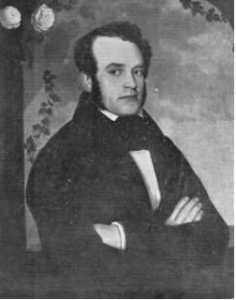Reflection
(Poet's title: Widerschein)
Set by Schubert:
D 639
Schubert’s second version of this song was previously catalogued as D 949[1818-1820]
Fischer harrt am Brückenbogen
Ach zu lange Zeit,
Blicket so sehnlich in die Wogen,
Denn sie ist noch weit.
Und sie schleichet um den Hügel,
Und das holde Bild
Leuchtet aus dem Wellenspiegel,
Lächelnd und so mild;
Und er sieht’s. Und durch Blumenränder
Schwimmt der süße Schein,
Und er hält sich am Geländer,
Sonst zieht’s ihn hinein.
The fisherman is waiting on the arch of the bridge,
Oh, for too long,
He looks into the waves with such longing
Since she is still so far away.
And she steals along over the hill,
And the beauteous image
Shines out of the mirroring waves,
Smiling and so gentle.
And he sees it – and between the flowery banks
Her sweet reflection swims along –
And he holds onto the railings,
Otherwise he would be pulled in! –
All translations into English that appear on this website, unless otherwise stated, are by Malcolm Wren. You are free to use them on condition that you acknowledge Malcolm Wren as the translator and schubertsong.uk as the source. Unless otherwise stated, the comments and essays that appear after the texts and translations are by Malcolm Wren and are © Copyright.
☙
Themes and images in this text:
Bridges By water – river banks Fish and fishing Flowers Hills and mountains Longing and yearning Mirrors and reflections Rivers (Bach) Smiling Surface of the water Sweetness Swimming Under the water, sinking and drowning Waves – Welle Waves – Woge
Fishing is supposed to make you patient, but as Tom stands on this bridge looking into the water he feels the time begin to drag. This is because he is not waiting for the fish to bite but for the arrival of his beloved. It is only as he fixes his eyes on the surface of the river that he manages to ‘enter the zone’. When the girl’s reflection appears in the water he is no longer capable of turning away. It is the image in and on the water that is tugging at him.
It is not only fishermen who are more interested in images and reflections than in the actual people themselves, of course.
☙
Original Spelling and Notes on the text Widerschein Fischer harrt am Brückenbogen Ach zu lange Zeit , Blicket so sehnlich in die Wogen, Denn sie ist noch weit. Und sie schleichet um den Hügel, Und das holde Bild Leuchtet aus dem Wellenspiegel, Lächelnd und so mild. Und er sieht's - und durch Blumenränder Schwimmt der süße Schein - Und er hält sich am Geländer, Sonst zieht's ihn hinein! - 1 Schubert changed Schlechta's original line here from 'Auf die liebe Maid' (For the beloved girl) to 'Ach zu lange Zeit' (Oh, for too long). 2 Schubert changed Schlechta's 'Schauet' (He beholds) to 'Blicket' (He looks) 3 Schubert changed Schlechta's 'zarte' (tender) to 'holde' (beauteous) 4 Schubert inserted this extra 'und' (and) here
Note on the Text by Peter Rastl
This is the first version of Schlechta’s poem, published 1818 in Wiener Zeitschrift für Kunst, Literatur, Theater und Mode. A second edition of this version, with minor modifications, appeared 1820 in Becker’s Taschenbuch zum geselligen Vergnügen, together with an attachment containing Schubert’s setting (his first version). Subsequently Schlechta published his collected poems in 1824 and included Widerschein in a substantially revised version (see below). In 1828 Schubert planned to publish the song again and created a second version, with a text modified by Schlechta. This version was posthumously published by Diabelli in 1832. Much later, before his death in 1875, Schlechta prepared for a new edition of his collected poems, with the title Ephemeren, which appeared in 1876. Here again Widerschein was substantially reworked (see below), and this third version of the poem resembles in some respects the text which Schubert used for his 1828 version of the song.
Schlechta’s 1824 version:
Harrt ein Fischer auf der Brücke
Die Geliebte säumt,
Schmollend taucht er seine Blicke
In den Bach – und träumt.
Doch die lauscht im nahen Flieder,
Und ihr Bildchen strahlt
Jetzt aus klaren Wellen wieder,
Treuer nie gemahlt.
Und der Fischer kennt die Bänder,
Kennt den süssen Schein:
Und er hält sich am Geländer
Sonst – zieht’s ihn hinein!
A fisherman is waiting on the bridge
His beloved is late,
In a sulk he drowns his gaze
In the brook – and starts dreaming.
However, she is listening in the nearby lilacs,
And her dear image is shining
Now, reflected in the clear waves,
Never more faithfully painted.
And the fisherman recognises the ribbons,
Recognises the sweet reflection:
And he holds onto the railings,
Otherwise he would be pulled in!
Dichtungen vom Freyherrn Franz von Schlechta. Erster Band. Wien, 1824. Im v. Hirschfeld’schen Verlage, page 90.
This is the second version of Schlechta’s poem, published 1824 in his collected poems. When Schubert created his second version of Widerschein in 1828, he received a modified text from Schlechta, based on this text, but with a different first line, which Schlechta kept in his third and substantially modified version, published in 1876.
Schlechta’s third version:
Ephemeren. Dichtungen von weiland Franz Freiherrn von Schlechta-Wssehrd. Mit einem Vorworte von Heinrich Laube. Zweite Auflage. Wien. Pest. Leipzig. A. Hartleben’s Verlag. 1876, page 9.
☙
Confirmed by Peter Rastl with Wiener Zeitschrift für Kunst, Literatur, Theater und Mode. Drittes Quartal des dritten Jahrgangs. 1818. Auf Kosten des Herausgebers. Gedruckt bey Anton Strauß. No.99. Dinstags, den 18. August 1818, page 804; and with W. G. Becker’s Taschenbuch zum geselligen Vergnügen. Herausgegeben von Friedrich Kind. Auf das Jahr 1821. Mit Königl. Sächsischem allergnädigstem Privilegio. Leipzig, bei Georg Joachim Göschen. Wien in der Carl Geroldschen Buchhandlung, page 399.
To see an early edition of the text, go to page 804 [196 von 370] here: http://digital.onb.ac.at/OnbViewer/viewer.faces?doc=ABO_%2BZ136925507


